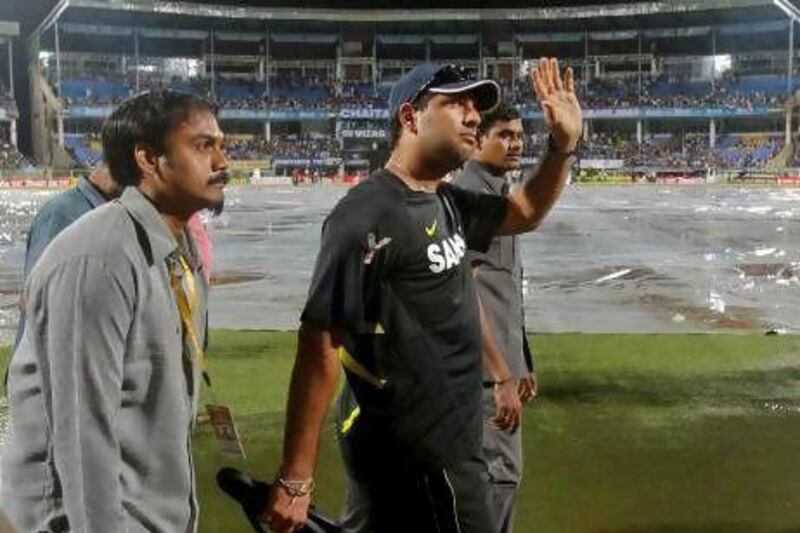Not a ball was bowled in Visakhapatnam on Saturday. Yet thousands of fans went home not unduly despondent because one of the India players had come out of the comfort of the dressing room to acknowledge them.
These days Yuvraj Singh is more than a cricketer. He is the man who survived a rare form of germ-cell cancer, whose recovery and return to the squad has served as an inspiration to so many that are not even remotely interested in the game.
It needed MS Dhoni, the India captain whose laid-back ways invariably puncture hype balloons, to give the occasion some perspective.
"The whole world is talking about his comeback in a manner as if they are helping him out," he said.
"In a way, it puts the burden on the individual.
"It's important to keep it as normal as possible, to not let him think what has really happened in his life."
What happened was this: Yuvraj struggled with bouts of vomiting right through the 2011 World Cup, unaware at the time that the cancer was spreading roots.
Despite the physical strains, he finished the tournament as its standout performer, just as he had in 2007 when India won the inaugural World Twenty20.
He made a Test half-century on the tour of England before a hand injury ruled him out of the final two games.
By the time he struggled through a Test against the West Indies in Delhi last November, looking lethargic in the field and listless with the bat, he looked lost and out of place.
The next time he was in the news, after going to the United States for treatment, was when most people realised what was behind the decline.
"I never thought I was going to come back and get a chance to play for India again," said Yuvraj in an interview with the broadcaster during the rained-out game.
"Kehte hain, dawa se badi dua hoti hai [They say prayers matter more than medicine]."
What does his return mean for Indian cricket?
His value to the limited-overs sides is beyond dispute. In both 2007 and 2011, Yuvraj's consistent performances with bat and ball played a huge part in India winning global trophies for the first time since the 1980s.
When most think of the World Twenty20 in 2007, they remember his six sixes off Stuart Broad. But as devastating was a 30-ball 70 that sent Australia out in the semi-final, in an era when they seemed invincible in the big events.
He repeated the dose in the 50-over World Cup four years later, celebrated on bended knees mid-pitch in Ahmedabad after Australia's grip on the title, which went all the way back to 1999, was finally released.
When he wasn't scoring runs at frenetic pace, Yuvraj chipped in with key wickets. Kevin Pietersen continued to rib him as a "pie-chucker", but some of the world's best batsmen swallowed the bait.
With the retirements of Rahul Dravid and VVS Laxman, a middle-order batting slot is still up for grabs in the Test side.
But until Yuvraj plays a first-class game or three for Punjab, he is unlikely to be risked in the five-day arena.
He has trained incredibly hard to get back into shape over the summer, but until he actually takes guard, no one knows if he can rediscover those six-hitting ways.
Yuvraj has not played a competitive game in blue clothes since the World Cup final in April 2011.
Mentally, however, no situation he faces in the middle is likely to faze him.
As Keith Miller, the legendary Australia all-rounder who served in the Second World War, said, notions of pressure on a sports field are laughable after you have had a Messerschmitt fighter on your tail. Or survived cancer.
Follow us
[ @SprtNationalUAE ]





